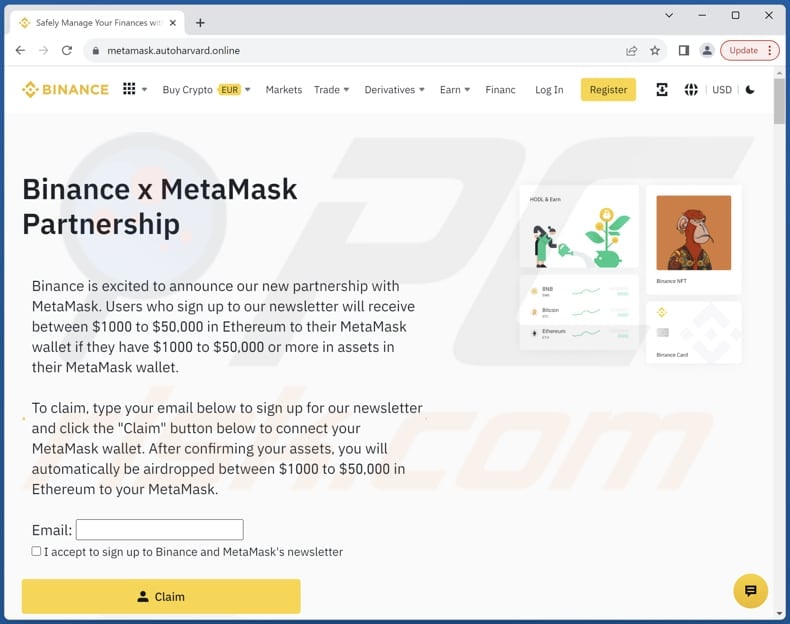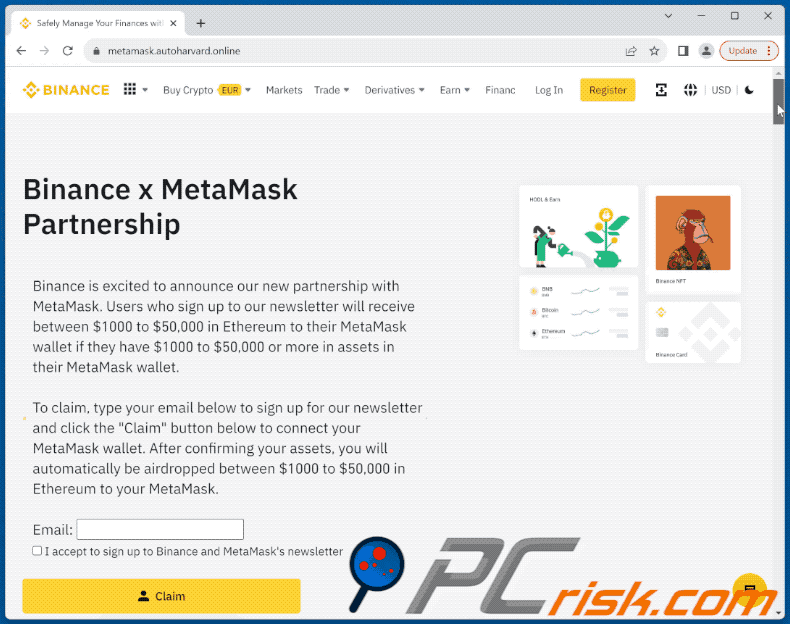How to identify scams like "Binance x MetaMask Partnership"
Phishing/ScamAlso Known As: Binance x MetaMask Partnership fake giveaway
Get free scan and check if your device is infected.
Remove it nowTo use full-featured product, you have to purchase a license for Combo Cleaner. Seven days free trial available. Combo Cleaner is owned and operated by RCS LT, the parent company of PCRisk.com.
What is "Binance x MetaMask Partnership" scam?
After a thorough examination, the determined outcome is that this appears to be a fraudulent scheme posing as a giveaway (in the form of an airdrop event) supposedly organized by Binance and MetaMask. It has been devised by scammers with the intent of pilfering cryptocurrency from unsuspecting individuals.

"Binance x MetaMask Partnership" in detail
The scam website (metamask.autoharvard[.]online) falsely claims that Binance and MetaMask have formed a partnership and are offering a substantial reward of between $1000 to $50,000 in Ethereum to users who sign up for their newsletter. The catch is that users must already have $1000 to $50,000 or more in assets in their MetaMask wallet to qualify for the purported airdrop.
To participate, victims are instructed to input their email address to subscribe to the newsletter and then click the "Claim" button to connect their MetaMask wallet. The scammers aim to make it seem legitimate by mentioning a confirmation of assets, but in reality, it is a ploy to gain access to personal information and compromise the MetaMask wallet.
In essence, this is a scam designed to trick users into approving a harmful contract, with the ultimate goal of stealing their cryptocurrency. Following the provided instructions results in the approval of a malicious contract strategically crafted to launch a cryptocurrency drainer. This drainer is purposefully designed to extract cryptocurrency from wallets.
Upon activation, the drainer facilitates the transfer of digital currency from the targeted wallet to the perpetrator's wallet. It is essential to understand that cryptocurrency transactions are generally irreversible, posing challenges in tracking and recovering funds once the transfer has taken place.
Typically, schemes involving cryptocurrency drainers, such as the one outlined in this article, are promoted through posts on X (previously known as Twitter). These posts are often written using compromised (stolen) accounts associated with different organizations, companies, or celebrities.
| Name | Binance x MetaMask Partnership fake giveaway |
| Threat Type | Phishing, Scam, Social Engineering, Fraud |
| Fake Claim | Participants can receive free cryptocurrency |
| Disguise | Legitimate giveaway hosted by Binance and Metamask |
| Related Domain | metamask.autoharvard[.]online |
| Detection Names (metamask.autoharvard[.]online) | Avira (Phishing), Combo Cleaner (Phishing), Emsisoft (Phishing), Kaspersky (Phishing), Sophos (Phishing), Full List Of Detections (VirusTotal) |
| Symptoms | Fake error messages, fake system warnings, pop-up errors, hoax computer scan. |
| Distribution methods | Compromised websites, rogue online pop-up ads, potentially unwanted applications. |
| Damage | Loss of sensitive private information, monetary loss, identity theft, possible malware infections. |
| Malware Removal (Windows) |
To eliminate possible malware infections, scan your computer with legitimate antivirus software. Our security researchers recommend using Combo Cleaner. Download Combo CleanerTo use full-featured product, you have to purchase a license for Combo Cleaner. 7 days free trial available. Combo Cleaner is owned and operated by RCS LT, the parent company of PCRisk.com. |
Similar scams in general
These scams typically lure unsuspecting individuals with promises of lucrative rewards or exclusive opportunities, ultimately leading victims to follow malicious instructions. Once activated, the drainers efficiently siphon cryptocurrency from targeted wallets, capitalizing on the irreversible nature of digital currency transactions and presenting significant challenges in tracking and recovering the pilfered funds.
Vigilance and awareness are paramount in safeguarding against falling victim to such deceptive practices in the ever-evolving landscape of online threats. Examples of similar scams are "Plug Wallet", "Skyborne Genesis $SKY Distribution", and "PonDX".
How did I open a scam website?
Clicking on phishing links in emails, falling for misleading advertisements, and encountering fake software updates are common ways users may end up on fraudulent sites. Scammers also exploit typosquatting, manipulate search engine results, and use social media to trick users into clicking on links, leading to scam websites.
In other cases, users land on shady sites when interacting with notifications from shady websites, ads displayed by adware or similar software, and websites that use rogue advertising networks (e.g., illegal movie streaming pages and torrent sites).
The scam described in our article above is likely to be promoted via fraudulent posts on X (Twitter) written using stolen/compromised accounts of legitimate companies, organizations, or real people (celebrities).
How to avoid visiting scam pages?
Before clicking on a link, check for misspellings or slight variations that might indicate a scam. Stick to reputable search engines like Google. Avoid clicking on links or downloading attachments from unexpected or suspicious emails. Be careful when clicking on links shared on social media, as well as ads, pop-ups, and buttons on shady sites.
Be skeptical of unsolicited messages or pop-ups claiming you've won a prize, need urgent action, or have a problem that requires immediate attention. Regularly update your operating system, web browser, and security software. Use reputable antivirus and anti-malware software.
If your computer is already infected with unwanted apps, we recommend running a scan with Combo Cleaner Antivirus for Windows to automatically eliminate them.
The appearance of "Binance x MetaMask Partnership" pop-up scam (GIF):

Instant automatic malware removal:
Manual threat removal might be a lengthy and complicated process that requires advanced IT skills. Combo Cleaner is a professional automatic malware removal tool that is recommended to get rid of malware. Download it by clicking the button below:
DOWNLOAD Combo CleanerBy downloading any software listed on this website you agree to our Privacy Policy and Terms of Use. To use full-featured product, you have to purchase a license for Combo Cleaner. 7 days free trial available. Combo Cleaner is owned and operated by RCS LT, the parent company of PCRisk.com.
Quick menu:
- What is Binance x MetaMask Partnership fake giveaway?
- How to identify a pop-up scam?
- How do pop-up scams work?
- How to remove fake pop-ups?
- How to prevent fake pop-ups?
- What to do if you fell for a pop-up scam?
How to identify a pop-up scam?
Pop-up windows with various fake messages are a common type of lures cybercriminals use. They collect sensitive personal data, trick Internet users into calling fake tech support numbers, subscribe to useless online services, invest in shady cryptocurrency schemes, etc.
While in the majority of cases these pop-ups don't infect users' devices with malware, they can cause direct monetary loss or could result in identity theft.
Cybercriminals strive to create their rogue pop-up windows to look trustworthy, however, scams typically have the following characteristics:
- Spelling mistakes and non-professional images - Closely inspect the information displayed in a pop-up. Spelling mistakes and unprofessional images could be a sign of a scam.
- Sense of urgency - Countdown timer with a couple of minutes on it, asking you to enter your personal information or subscribe to some online service.
- Statements that you won something - If you haven't participated in a lottery, online competition, etc., and you see a pop-up window stating that you won.
- Computer or mobile device scan - A pop-up window that scans your device and informs of detected issues - is undoubtedly a scam; webpages cannot perform such actions.
- Exclusivity - Pop-up windows stating that only you are given secret access to a financial scheme that can quickly make you rich.
Example of a pop-up scam:

How do pop-up scams work?
Cybercriminals and deceptive marketers usually use various advertising networks, search engine poisoning techniques, and shady websites to generate traffic to their pop-ups. Users land on their online lures after clicking on fake download buttons, using a torrent website, or simply clicking on an Internet search engine result.
Based on users' location and device information, they are presented with a scam pop-up. Lures presented in such pop-ups range from get-rich-quick schemes to fake virus scans.
How to remove fake pop-ups?
In most cases, pop-up scams do not infect users' devices with malware. If you encountered a scam pop-up, simply closing it should be enough. In some cases scam, pop-ups may be hard to close; in such cases - close your Internet browser and restart it.
In extremely rare cases, you might need to reset your Internet browser. For this, use our instructions explaining how to reset Internet browser settings.
How to prevent fake pop-ups?
To prevent seeing pop-up scams, you should visit only reputable websites. Torrent, Crack, free online movie streaming, YouTube video download, and other websites of similar reputation commonly redirect Internet users to pop-up scams.
To minimize the risk of encountering pop-up scams, you should keep your Internet browsers up-to-date and use reputable anti-malware application. For this purpose, we recommend Combo Cleaner Antivirus for Windows.
What to do if you fell for a pop-up scam?
This depends on the type of scam that you fell for. Most commonly, pop-up scams try to trick users into sending money, giving away personal information, or giving access to one's device.
- If you sent money to scammers: You should contact your financial institution and explain that you were scammed. If informed promptly, there's a chance to get your money back.
- If you gave away your personal information: You should change your passwords and enable two-factor authentication in all online services that you use. Visit Federal Trade Commission to report identity theft and get personalized recovery steps.
- If you let scammers connect to your device: You should scan your computer with reputable anti-malware (we recommend Combo Cleaner Antivirus for Windows) - cyber criminals could have planted trojans, keyloggers, and other malware, don't use your computer until removing possible threats.
- Help other Internet users: report Internet scams to Federal Trade Commission.
Frequently Asked Questions (FAQ)
What is a fake cryptocurrency giveaway?
A misleading cryptocurrency distribution (airdrop) is a deceptive plot wherein fraudsters assert to provide free crypto to trick individuals into performing specific actions.
What is the purpose of a giveaway scam?
Scammers initiate giveaway frauds with the aim of deceiving individuals, intending to obtain sensitive information and cryptocurrency.
Why do I encounter fake giveaways?
To trap victims, scammers employ a variety of tactics, such as creating fake social media accounts, deceptive websites, misleading advertisements, adware, notifications from untrustworthy sources, and similar channels.
Will Combo Cleaner protect me from pop-up scams?
Combo Cleaner is equipped with the capability to conduct comprehensive scans of all websites users visit, effectively identifying malicious sites, including those linked to scams. The application promptly notifies users and limits access to untrustworthy websites.
Share:

Tomas Meskauskas
Expert security researcher, professional malware analyst
I am passionate about computer security and technology. I have an experience of over 10 years working in various companies related to computer technical issue solving and Internet security. I have been working as an author and editor for pcrisk.com since 2010. Follow me on Twitter and LinkedIn to stay informed about the latest online security threats.
PCrisk security portal is brought by a company RCS LT.
Joined forces of security researchers help educate computer users about the latest online security threats. More information about the company RCS LT.
Our malware removal guides are free. However, if you want to support us you can send us a donation.
DonatePCrisk security portal is brought by a company RCS LT.
Joined forces of security researchers help educate computer users about the latest online security threats. More information about the company RCS LT.
Our malware removal guides are free. However, if you want to support us you can send us a donation.
Donate
▼ Show Discussion